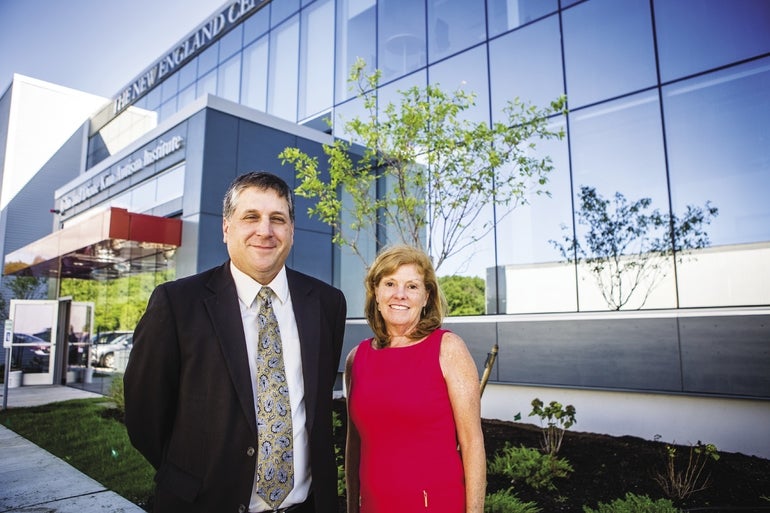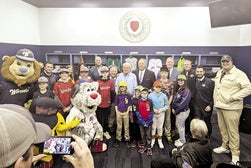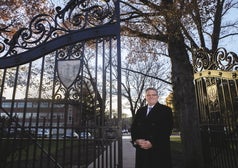New England Center for Children opens $11M autism institute
 PHOTO/NATHAN FISKE
Jared Bouzan, chief development officer, and Katherine Foster, chief operating officer, outside of NECC's new $10.5-million autism institute.
PHOTO/NATHAN FISKE
Jared Bouzan, chief development officer, and Katherine Foster, chief operating officer, outside of NECC's new $10.5-million autism institute.
The newest addition to the New England Center for Children is easy to spot along Route 9. A three-story building with glistening blue windows and the nonprofit's name etched across the top in all capital letters greets drivers coming in from the west as they head through Southborough.
The 33,000-square-foot building is a visual boost for a company that already has worldwide name recognition in the autism services universe. The $10.5-million John and Diane Kim Autism Institute, opening next month, will house research, professional development and technology for the center, allowing it to continue to train its workforce, improve its technology and develop best practices.
The institute, completed with a $2.5 million lead gift from John and Diane Kim, is a physical manifestation of a $10.9-million capital campaign. Remaining funds will be used to renovate the center's main building into a state-of-the-art student activities center with an art-and-music room, computer lab, student library and a school store.
By expanding, NECC will expand its interactive, cloud-based educational software system, enhance its busy professional development practices, and conduct more research in order to better understand autism and teach the growing number of children with the diagnosis.
“[The Institute] is a place for us to really continue to create a state-of-the-art program with children with autism on the site, but also to learn what the best instructional practices are for these children, so we can put that into [our technology] and share it with kids outside of the program,” said NECC COO Katherine Foster.
$77-million global nonprofit
NECC has come a long way since its founding 41 years ago on the grounds of the Taunton State Hospital at an old nurses' residence with six patients.
The $77-million nonprofit – still managed by founder and CEO Vincent Strully Jr. – employs more than 1,000 people; runs day, home-based, intensive, residential and in-school programs for more than 1,000 children across the autism spectrum aged 14 months to 22 years; operates a second location in Abu Dhabi; and provides on-site continuing education master's and doctoral degrees for its staff, according to NECC.
Its software, the Autism Curriculum Encyclopedia, is used by 4,700 students in 24 states and nine countries.
All teachings are based on the principles of applied behavior analysis, an evidence-based method effective in helping children with autism, Foster said.
On Aug. 22, a lower-functioning child was working on data entry at the school's workforce office with his teacher, who checked off a box every time the student entered a set of data into a computer. Once all the boxes on the sheet were checked, the student got a reward.
Since the student couldn't speak, he told his teacher which reward he wanted by pressing buttons on an iPad.
Some higher functioning students stopped to chat with staff during a tour, using administrators' first names.
That fun learning environment starts with a committed workforce, said Chief Development Officer Jared Bouzan.
“They've taken the oath to be teachers that work with children with autism. You walk around here and you see the smiles on their faces and the desire to work with these children – it's such an extraordinary thing to see,” said Bouzan.
Need for services
The number of autism diagnoses has increased exponentially since even the turn of the century – from 1 in 150 kids in 2000 to 1 in 68 kids today, according to the Centers for Disease Control and Prevention. A 2013 report from the state Autism Commission applied CDC estimates to the Massachusetts population and suggested around 75,000 people in the state have autism. That estimate assumes that the disorder is equally prevalent among age groups and is probably a bit high, said Carolyn J. Kain, executive director of the Autism Commission. The Autism Commission that put out the report has since been dissolved and was reestablished last fall.
In a state where insurance coverage of autism services is mandated by law, one of the biggest obstacles to getting the right services to a child on the autism spectrum is a shortage of professionals who can work with them, said Elaine Gabovitch, an autism spectrum disorder specialist at UMass Medical School.
“We know that applied behavior analysis is the gold standard in treatment for children on the spectrum. But if you can't get access to that because there aren't enough providers, then what happens? You're kind of stuck,” said Gabovitch. “In those cases, those children do not have the same benefits as children who have access to high quality applied behavior analysis therapists.”
Figures to measure the exact shortage of applied behavior analysis therapists and other specialists don't yet exist, Gabovitch said, though that's something UMass Medical School's Eunice Kennedy Shriver Center is working on. So far, the sense is that the closer to Boston a child lives, the more likely he or she is have a trained therapist within his or her school system. Qualified workers are harder to find in rural areas, Gabovitch said.
The U.S. Bureau of Labor Statistics estimates that the social work field will grow by 12 percent between 2014 and 2024, a faster-than-average rate.
To address staffing, NECC recruits directly from undergraduate psychology departments around the country, Foster said. Employees can get their certification in applied behavior analysis or special education for free right there at the center, through partnerships with Simmons College and Western New England University. More than 1,000 people have gone through the program since it launched about 20 years ago, Foster said.
“We pitch to them, 'Come work at the New England Center, get your graduate certification in special education or applied behavior analysis and really learn how to work with these children.' It's very successful,” she said.
Industry-wide efforts
Other autism services nonprofits said they had to come up with creative ways to address workforce challenges. At HMEA, Inc. in Franklin, which works with 3,000 families, about 100 people are on the waitlist for in-home services, said President and CEO Mike Moloney.
“Your child is diagnosed, your insurance covers it, but you have to wait. It's a chronic and persistent problem,” Moloney said.
To help address its workforce challenges, HMEA in 2014 launched a program with Assumption College to offer employment opportunities for students interested in working as applied behavior analysis therapists.
The program was aided by a $56,700 grant from the Health Foundation of Central Massachusetts.
Worcester's Behavioral Concepts Inc. hired 26 applied behavior analysis therapists in the first two months of 2016, and is still hiring, according to the company. It launched a partnership last year with Bay Path University in Longmeadow through which staff can get a master's degree and, eventually, a board certification as a behavior analyst.
Behavioral Concepts created an autism specialization certificate with Quinsigamond Community College and has a partnership with Assumption, where students work 30 hours a week at BCI or its onsite school, the Center for Applied Behavioral Instruction.
The new NECC center
NECC's day and residential student programs are at capacity, Foster said. But she said she hopes the institute and capital campaign will allow NECC to enhance its workforce training to increase availability of NECC programs.
“To have a broader impact, we're going to have to disseminate the knowledge we've acquired over the past 41 years, so that's what that autism institute does,” Foster said.












0 Comments